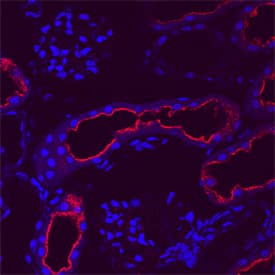Rat CCL3/MIP-1 alpha Antibody
R&D Systems, part of Bio-Techne | Catalog # MAB66251

Key Product Details
Species Reactivity
Rat
Applications
Immunohistochemistry
Label
Unconjugated
Antibody Source
Monoclonal Mouse IgG2B Clone # 769303
Product Specifications
Immunogen
E. coli-derived recombinant rat CCL3/MIP-1 alpha
Ala24-Ala92
Accession # P50229
Ala24-Ala92
Accession # P50229
Specificity
Detects rat CCL3/MIP-1 alpha in direct ELISAs. In direct ELISAs, less than 50%
cross-reactivity with recombinant mouse and cotton rat CCL3/MIP-1 alpha is observed,
and no cross-reactivity with recombinant human, canine, and HHV CCL3/MIP-1
alpha, recombinant rat CCL4/MIP-1 beta, or recombinant mouse CCL5/RANTES is
observed.
Clonality
Monoclonal
Host
Mouse
Isotype
IgG2B
Scientific Data Images for Rat CCL3/MIP-1 alpha Antibody
CCL3/MIP‑1 alpha in Rat Kidney.
CCL3/MIP-1a was detected in perfusion fixed frozen sections of rat kidney using Mouse Anti-Rat CCL3/MIP-1a Monoclonal Antibody (Catalog # MAB66251) at 25 µg/mL overnight at 4 °C. Tissue was stained using the NorthernLights™ 557-conjugated Anti-Mouse IgG Secondary Antibody (red; Catalog # NL007) and counterstained with hematoxylin (blue). Specific staining was localized to the plasma membranes of epithelial cells in convoluted tubules. View our protocol for Fluorescent IHC Staining of Frozen Tissue Sections.Applications for Rat CCL3/MIP-1 alpha Antibody
Application
Recommended Usage
Immunohistochemistry
8-25 µg/mL
Sample: Perfusion fixed frozen sections of rat kidney
Sample: Perfusion fixed frozen sections of rat kidney
Formulation, Preparation, and Storage
Purification
Protein A or G purified from hybridoma culture supernatant
Reconstitution
Sterile PBS to a final concentration of 0.5 mg/mL. For liquid material, refer to CoA for concentration.
Formulation
Lyophilized from a 0.2 μm filtered solution in PBS with Trehalose. *Small pack size (SP) is supplied either lyophilized or as a 0.2 µm filtered solution in PBS.
Shipping
Lyophilized product is shipped at ambient temperature. Liquid small pack size (-SP) is shipped with polar packs. Upon receipt, store immediately at the temperature recommended below.
Stability & Storage
Use a manual defrost freezer and avoid repeated freeze-thaw cycles.
- 12 months from date of receipt, -20 to -70 °C as supplied.
- 1 month, 2 to 8 °C under sterile conditions after reconstitution.
- 6 months, -20 to -70 °C under sterile conditions after reconstitution.
Background: CCL3/MIP-1 alpha
References
- Menten, P. et al. (2002) Cytokine Growth Factor Rev. 13:455.
- Shi, M.M. et al. (1995) Biochem. Biophys. Res. Commun. 211:289.
- Graham, G.J. et al. (1990) Nature 344:442.
- Wagner, L. et al. (1998) Nature 391:908.
- Graham, G.J. et al. (1994) J. Biol. Chem. 269:4974.
- Ren, M. et al. (2010) EMBO J. 29:3952.
- Weber, M. et al. (2004) Mol. Biol. Cell 15:2492
- Taub, D.D. et al. (1993) Science 260:355.
- Bernardini, G. et al. (2008) Blood 111:3626.
- Lee, S.C. et al. (2000) J. Immunol. 164:3392.
- Wu, Y. et al. (2008) J. Immunol. 181:6384.
- Cook, D.N. et al. (1995) Science 269:1583.
- Chintalacharuvu, S.R. et al. (2005) Immunol. Lett. 100:202.
- Ajuebor, M.N. et al. (2004) Eur. J. Immunol. 34:2907.
- Cocchi, F. et al. (1995) Science 270:1811.
- Zhang, N. et al. (2005) Proc. Natl. Acad. Sci. 102:4536.
Alternate Names
G0S19-1, LD78a, MIP-1 alpha, MIP1 alpha, MIP1A, PAT 464.1, SCYA3, SIS-beta
Entrez Gene IDs
Gene Symbol
CCL3
UniProt
Additional CCL3/MIP-1 alpha Products
Product Documents for Rat CCL3/MIP-1 alpha Antibody
Product Specific Notices for Rat CCL3/MIP-1 alpha Antibody
For research use only
